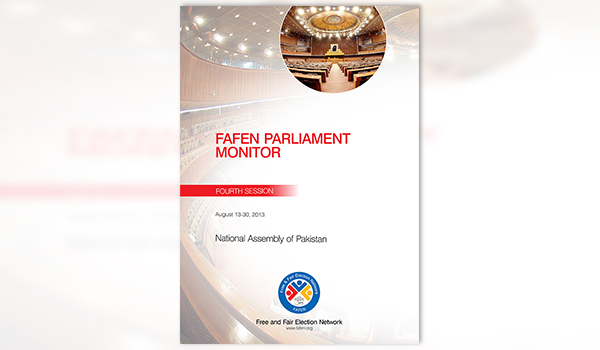The National Assembly’s fourth session was marked by the introduction of two treasury-backed bills and the formation of 34 Standing Committees while the House left 79% of the agenda on the orders of the day unaddressed. Low attendance and participation of lawmakers was observed during the session.
The government introduced the Constitution (23rd Amendment) Bill seeking 20-year extension for provincial quota in the federal government services. This is the third extension by amending the article 27 of the constitution to provide “safeguards against discrimination in services”. Additionally, apart from the Service Tribunals (Amendment) Bill 2013, the Civil Servants (Amendment) Ordinance 2013 and the Electoral Laws (Amendment) Ordinance 2013 were introduced during the session.
The House did not take up 79 of 101 agenda items on the orders of the day. As the agenda for the private members’ day is set ambitiously, most of the items are left unaddressed. In the fourth session, 76% of the agenda on the three private days was left unaddressed. Overall, fourteen resolutions, four private member bills, two calling attention notices, five matters of public importance and a motion for amending rule 169 of the rules and procedures of National Assembly were left unaddressed. Setting aside the regular agenda, the House adopted three supplementary resolutions.
Members’ participation was observed low as more than half (58% lawmakers) did not contribute to the assembly business – debates and submission of agenda. Of the participating members, more took part in debates than tabling agenda on the orders of the day. Eight percent (27 MNAs) submitted agenda, 22% (73 MNAs) debated it while 13% (43 MNAs) did both.
Low attendance persisted throughout the sitting: 21% (67 MNAs) were present on average at the beginning, 22% (72) at the end and a maximum 44% (142) on average at any one point. The minority members’ attendance was more promising as on average seven out of total 10 MNAs attended the sitting. The lack of quorum was pointed out two times in the seventh and 12th sittings. A headcount found the quorum complete on both occasions.
The 13-sitting session from August 13 to August 30 lasted 34 hours and 47 minutes. The sittings were delayed on average by 31 minutes and lasted two hours and 41 minutes. The assembly took three breaks for a total of 105 minute – or 5% of the session time.
The Prime Minister did not attend the session while the Leader of the Opposition was present in eleven sittings. The Speaker presided over 52% of the session (18 hours and eight minutes), the Deputy Speaker 35% (12 hours), while the remaining proceedings were chaired by members of the Panel of Chairpersons.
The House adopted four out of eighteen resolutions on the agenda. Two resolutions were adopted to condemn the Line of Control (LoC) violations. Another expressed dismay over the military coup and violence in Egypt and the fourth called for ending beggary in Islamabad. The adopted resolutions were moved either singly or jointly by legislators of JI, PML-N, PTI, MQM, PkMAP, PPPP and AMLP.
Lawmakers belonging to PPPP, JUI-F, PkMAP, MQM, PTI, PML-N, AMLP and an independent member from FATA took part in debate on the presidential address to the joint session of the parliament on June 10, 2013. In the first sitting, the agenda on the orders of the day was suspended under Rule 288 of the NA’s Rules of Procedure to debate the LoC violations by India.
Out of 256 starred questions on the agenda, 62 were taken up and answered. Additionally, the legislators asked 138 supplementary questions.
During the sixth sitting, the assembly approved a motion for forming 34 Standing Committees. The Standing Committee on Finance, Revenue, Economic Affairs and Statistics presented two reports in the House during the session.
Ten Calling Attention Notices were taken up. They were on increase in electricity and gas tariffs, floods, negligence of WAPDA in Buner, delay in construction of Khanewal-Lodhran Expressway, terrorist attacks in Islamabad and on trains, environmental degradation, education, labeling of mosques as terrorist organizations by the New York Police Department, and a possible American attack on Syria and the threat of a Russian attack on Saudi Arabia.
A female PML-N MNA tabled a motion under rule 259 to discuss the extravagant spending of Pakistani embassies abroad. Additionally, a matter of public importance was submitted by a PTI male legislator on the failure of the Federal Board of Revenue to achieve the targets set for the collection of taxes for 2012-13.
The lawmakers spoke on 292 points of order consuming 15 hours and 12 minutes of the proceedings. Additionally a PML-N MNA submitted a question of privilege about police’s attitude, which was referred to the relevant committee.
The House did not take up an MQM sponsored motion to amend rule 169 of the Rules of Procedure and Conduct of Business in the National Assembly 2007.
For complete report click here









